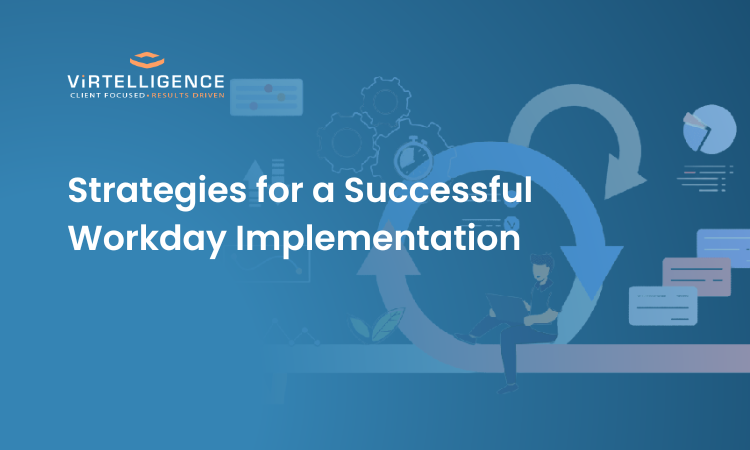
Workday offers a unified platform that brings together finance, human resources, and planning, tailored to meet the specific demands of healthcare organizations. Workday Implementation represents a strategic transformation, aligning technology with clinical practices, administrative workflows, and patient-centered care.
However, this implementation is complex and requires meticulous planning and a deep understanding of healthcare operations and regulatory compliance. Virtelligence, with extensive experience in healthcare IT, provides the expertise needed to guide organizations through this transformative process.
This article will explore the essential phases of Workday implementation in healthcare, highlighting the challenges and best practices that define success in this specialized field. Here are the essential strategies to ensure a successful Workday implementation:
Workday Implementation Cycle
The Workday implementation usually follows 6 major phases:
1. Planning and Assessment
Current State Analysis: Understanding the current processes, technologies, and goals of your organization allows for a tailored implementation strategy.
Alignment with Objectives: Ensure that Workday’s solutions align with your organizational goals and business strategies.
Budget Planning: Establish a clear budget framework, taking into account potential contingencies.
2. Analysis
Requirement Gathering: Work with consultants to understand the precise requirements and expectations from the Workday platform.
Business Process Mapping: Identify and map existing workflows and pinpoint areas that will benefit from Workday’s solutions.
Stakeholder Engagement: Engage key stakeholders to ensure alignment and buy-in.
Design
The design phase is where the detailed planning of the implementation comes to life. It consists of several vital components:
Project Team Formation: Assembling the right team is crucial for success:
Project Manager: Oversees the implementation, ensuring daily activities align with the plan and fostering clear communication among team members.
Technical Lead: Addresses and resolves technical challenges, acting as a bridge between the technological aspects and the overall project goals.
Subject Matter Experts: Provides essential insights on organizational changes and how Workday can be tailored to fit those needs.
Quality Assurance Team: Focuses on identifying potential issues through rigorous testing, ensuring the final product is of the highest quality.
Functional Specifications: This document outlines the detailed requirements for each Workday module being implemented. It serves as a roadmap for developers and stakeholders.
Project Timeline: An essential tool for keeping the project on track, the timeline breaks down the implementation into milestones and checkpoints, allowing for real-time progress monitoring.
Project Schedule: A breakdown of who is doing what, when, and how. This schedule allocates resources, assigns responsibilities, and sets deadlines for different phases, ensuring a smooth workflow.
Work Statement: The work statement is a comprehensive compilation of the project’s deliverables. It provides clarity on what is expected from each team member and what needs to be delivered at every stage.
4. Development
The development phase is where the actual building of the Workday system takes place. This requires a well-coordinated effort with a focus on the following:
Collaborative Approach: Creating a Workday system tailored to an organization requires input from various stakeholders. Facilitating collaboration ensures that the system reflects the unique needs and expectations of all involved.
Regular Updates: Frequent communication and updates among team members and with stakeholders ensure alignment with the project goals. Regular status meetings can help in detecting and addressing any misalignments early.
Testing: An ongoing process throughout the development phase, testing identifies potential issues and inconsistencies. This includes unit testing, integration testing, and user acceptance testing, all aimed at ensuring the Workday system is robust and reliable.
5. Delivery
The delivery phase is the culmination of all the previous stages and sets the stage for the system’s live operation. Key elements include:
Final Testing: This is the phase where all the developed modules are tested in a cohesive manner. Rigorous testing against the functional specifications ensures that everything functions as expected.
Go-Live Support: As the system is launched, Virtelligence consultants remain on standby to troubleshoot any immediate issues, ensuring a smooth transition to the new system.
Documentation: Creating comprehensive documentation is vital for ongoing support and future modifications. This includes user guides, technical manuals, and other materials that support end-user training and system maintenance.
6. Training and Support
Post-delivery support is essential to the continued success of the Workday implementation:
Training Modules: Virtelligence develops tailored training modules for different user groups within your organization, ensuring a smooth transition to the new system.
Ongoing Support: Even after go-live, Virtelligence offers ongoing support to make necessary optimizations and bug fixes, adapting the system to your evolving needs.
Feedback Loop: Virtelligence encourages continuous feedback from all users, fostering a process of continuous improvement, and aligning the system with organizational goals, and user expectations.
How Virtelligence Can Help
Virtelligence’s Workday consultants are seasoned professionals with extensive experience in implementing Workday for diverse organizations. Our offerings include:
Strategic Planning: We tailor the Workday implementation to your unique organizational needs, aligning with your specific goals and challenges.
End-to-End Support: From initial planning to ongoing support, Virtelligence is with you every step of the way, ensuring a consistent and cohesive implementation process.
Custom Solutions: We are adept at creating custom solutions to address specific challenges, leveraging Workday’s flexibility to build a system that works for you.
Highly Experienced Team: Our team of Workday experts ensures a smooth and efficient implementation, guided by best practices and deep industry knowledge.
With Virtelligence’s proven track record and commitment to excellence, we transform the Workday implementation into a very smooth and rewarding process. Our client-centric approach focuses on delivering value, efficiency, and alignment with your organizational strategy.
Whether you’re new to Workday or looking to optimize an existing system, Virtelligence stands ready to assist. Contact us today to discuss how we can help your organization thrive with Workday.






